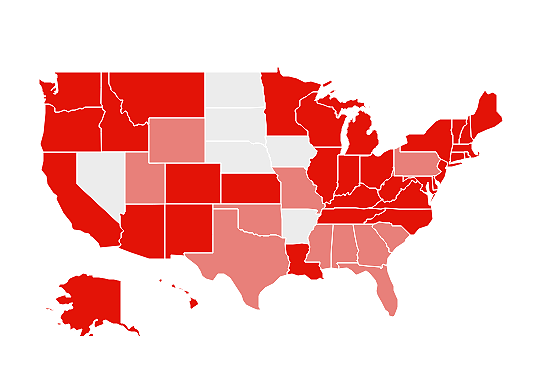National news outlets are reporting that more than 270 million Americans in at least 33 states are now being ordered to stay at home to stop the spread of the new coronavirus. The majority of those lists - published by CNN and The New York Times, for example - include Tennessee among states with stay-at-home orders.
Residents of the Volunteer State, however, are not being ordered to stay inside. They are being asked.
Gov. Bill Lee announced Monday in an executive order that Tennesseans are "urged to stay at home." The new guidance didn't go as far as the clear stay-at-home directives from other Republican-led states - including Maryland and Indiana - that on Tuesday had fewer confirmed COVID-19 cases than Tennessee.
Lee does not intend for his most recent order to go as far as other states.
"This is not a mandated 'shelter in place' order, because it remains deeply important to me to protect personal liberties," the governor said during a briefing on Monday.
Lee's action, labeled in the executive order as "safer at home," began just before midnight on Tuesday and is scheduled to last until April 14.
The governor is facing increasing criticism for his response to the global pandemic. In mid-March, when there were more than 150 confirmed cases in Tennessee, Lee said state residents would practice safe social distancing on their own, without needing direct governmental orders to do so, according to a call with local leaders obtained by the Chattanooga Times Free Press. Meanwhile, bars and other gathering places throughout the state remained busy.
Lee's guidance has tightened in the past week, including ordering all non-essential businesses closed. But the state's case count continues to rise. By Wednesday around noon, there were 2,239 confirmed cases of COVID-19 and 23 statewide deaths, including 50 cases in Hamilton County. During the rise, the governor has repeatedly urged residents to stay home.
"I want to, again, speak to the Tennesseans who have the privilege and the capacity to safely stay at home for the next two weeks," he said during a briefing on Tuesday. "We need you to do that. We need you to heed this call for you to stay at home for two weeks."
In neighboring Kentucky, Gov. Andy Beshear told his residents to avoid going to Tennessee unless absolutely necessary, the Lexington Herald-Leader reported last week.
Beshear argued that "your likelihood of getting infected and potentially bringing back the coronavirus may be greater in other states than ours right now."
COVID-19 spreads primarily person-to-person through respiratory droplets released when someone sneezes or coughs. No vaccine currently exists, so the best way to prevent illness or spreading the virus is to avoid coming into contact with it, according to the U.S. Centers for Disease Control and Prevention.
This week, a group of about 2,000 physicians signed an online petition asking Lee to consider a mandatory shelter-in-place order. The health experts said a statewide order was essential to save lives by stopping the spread of the virus and reducing the strain on hospital systems.
Local doctors already feel overwhelmed in what many are characterizing as a war that hospital systems do not have the necessary equipment to fight.
The peak demand for hospital services in the U.S. from COVID-19 is expected to "exceed capacity substantially" despite current social distancing measures, according to an analysis by the Institute for Health Metrics and Evaluation at the University of Washington.
Health care officials say there will not be enough available hospital beds in the Chattanooga area over the next six months to meet the demand for the necessary care to treat COVID-19, unless extreme social distancing measures are taken. In the past month, local hospitals have repeatedly declined to answer questions about their COVID-19 preparations, including whether they had increased their bed capacity, how many patients were now in the hospitals and if they had closed floors to prepare for a COVID-19 patient surge.
Contact Wyatt Massey at wmassey@timesfreepress.com or 423-757-6249. Follow him on Twitter @news4mass.
